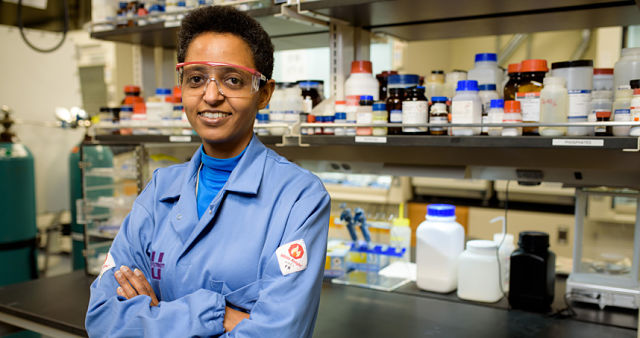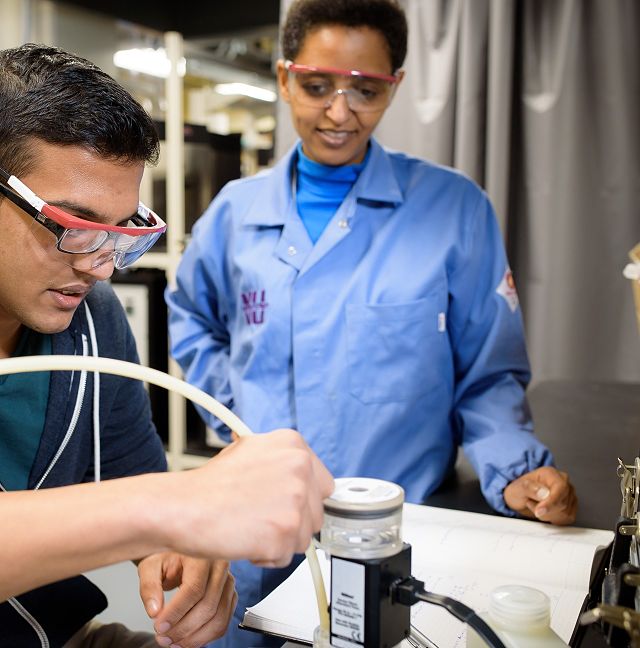 Fuel cell pioneer Sossina Haile focuses on social good on a global scale. Born in Ethiopia, [Sossina’s] family fled the country in the ’70s after a military coup. They settled in Minnesota, and Haile went on to earn academic degrees in materials science and engineering on both coasts, at the Massachusetts Institute of Technology and the University of California, Berkeley.(Northwestern Magazine)
Fuel cell pioneer Sossina Haile focuses on social good on a global scale. Born in Ethiopia, [Sossina’s] family fled the country in the ’70s after a military coup. They settled in Minnesota, and Haile went on to earn academic degrees in materials science and engineering on both coasts, at the Massachusetts Institute of Technology and the University of California, Berkeley.(Northwestern Magazine)
Northwestern Magazine
Basic Science Leads to Sustainable Solutions
Materials scientist and engineer Sossina Haile couldn’t have predicted that the cost of solar and wind energy would plummet in recent years, or that places like California would start paying customers to take electricity because their supply outstripped demand. But once those things happened, she had a solution.
Haile’s team developed a way to convert electricity into hydrogen, store it and convert it back to electricity when more is needed. This breakthrough offers a way to rebalance, and even stabilize, the U.S. energy grid.
“That’s the benefit of doing work on fundamental materials,” says Haile, a professor in Northwestern’s McCormick School of Engineering. “You can switch gears because you understand the properties of your materials and their potential applications.”
Equipped with this technology, a storage company could take excess electricity from ComEd or PG&E, for example, and store it as hydrogen, Haile says. And when ComEd needs more electricity to power its customers’ air conditioners in the middle of summer, it would pay that storage company to convert hydrogen back to electricity. “That firm will make a killing,” Haile says.
“I had to learn that quiet persistence only got you so far.”
BACK TO BASICS
In 2001 Haile created the first solid acid fuel cell, which converts hydrogen, or a fuel like natural gas, into electricity. In recognition of this breakthrough, Newsweek magazine named Haile one of 12 people to watch. She was also featured, along with 11 other women in science and technology, on the ceiling of Grand Central Station in New York City.
Haile made a subsequent world-first discovery in 2010, when she converted solar energy into hydrogen more efficiently than photosynthesis, the process by which living plants build their organic matter. This work, which she described in a 2012 TEDx talk and for which she was awarded the 2012 International Prize in Ceramics, opened the door to larger-scale efforts to use sunlight to directly make renewable fuels.
And then the cost of solar and wind energy plummeted, and Haile’s basic science background proved invaluable, enabling her to switch her research focus back and forth between electricity and hydrogen.
Now, Haile’s lab is reconfiguring their solid acid fuel cells so the devices can convert ammonia into high-purity hydrogen. “This would make it possible to use ammonia as a hydrogen carrier,” Haile says, “avoiding the cost of building a new delivery infrastructure to supply hydrogen to fuel cell vehicles.”

Sossina Haile works with a student in her lab before the COVID-19 pandemic. (Photo: Northwestern Magazine)
ENERGY INNOVATOR
Born in Ethiopia, Haile’s family fled the country in the ’70s after a military coup. They settled in Minnesota, and Haile went on to earn academic degrees in materials science and engineering on both coasts, at the Massachusetts Institute of Technology and the University of California, Berkeley.
Haile’s work in sustainable energy was recognized early on, with a National Young Investigator Award from the National Science Foundation (NSF) and a Fulbright Fellowship, among other honors. But just a few years into teaching, she found herself “in a very big ocean with lots of very big fish.”
“I had to learn that quiet persistence only got you so far,” Haile says. “Success required focusing on the most important problems in my field, finding the right questions to ask and convincing the world, with just a bit of fanfare, that I could solve those problems.”
Read more at magazine.northwestern.edu »
—
Join the conversation on Twitter and Facebook.

























